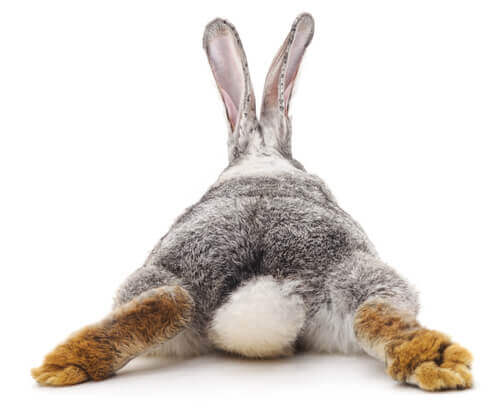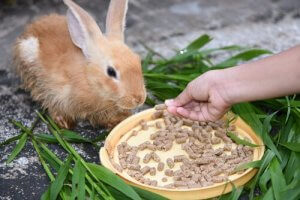What to Do If Your Rabbit Has Diarrhea

If your rabbit has diarrhea, it may be caused by a number of different factors. However, it’s normally related to problems in the gastrointestinal system. Understanding what these factors are and how to combat them is essential for preventing this issue from occurring again in the future.
When it comes to determining whether your rabbit has diarrhea, it’s important to look out for a few key signs. The most common is the presence of thick, sticky feces on the tail and rear. These irregular droppings may merge with normal, dry ones, so that they come together to form a large mass.
The frequency and quantity of these droppings will increase, until they occur several times a day. This excessive number of bowel movements will contribute to localized irritation around the rear, which may eventually lead to hair loss.
Main causes
Diet is one of the most important factors when it comes to the gastrointestinal tract. A sudden change in the type of food, an increase in fiber, or the ingestion of unsuitable substances can lead to illness and disease.
A lack of fiber, on the other hand, can cause the gut to slow down. This is something that usually occurs as a result of too many carbohydrates, and is more common in rabbits that eat a pellet-based diet that doesn’t contain enough hay.
All this results in a change in the pH of the gastrointestinal tract. This, in turn, alters the gut flora that are in charge of fermenting and digesting food.

Overconsumption of high-carbohydrate foods promotes the existence of gas and toxin-producing bacteria, causing the animal to produce loose stools. This situation leads to what is known as gastrointestinal or gut stasis. This usually means that there is a blockage in the intestines, preventing food from passing through. The animal may also display symptoms such as lethargy, loss of appetite and dehydration.
As well as dietary changes, diarrhea in rabbits may be the result of stress or underlying metabolic issues related to the liver or kidneys.
What to do if your rabbit has diarrhea
In the majority of cases, you can improve the situation by making changes to your pet’s diet, especially if the animal only has occasional diarrhea, and no other health issues. This normally means significantly reducing the amount of fresh fruit and veg in their diet, or cutting it out altogether. At the same time, you should avoid giving them any grain-based treats.
For the most part, a rabbit’s diet should be made up of hay (either fresh or commercial), and a reasonable portion of pellets. Ask your vet to recommend a balanced pellet food for your pet, and for advice on portion sizes.

It’s important to remove any droppings that are stuck to your pet’s fur. Keeping the area clean is essential for preventing irritation and skin infections. Plus, while the droppings are still soft, they can attract flies. The flies then lay eggs on your pet’s skin, leading to a more serious condition.
In other circumstances, you can only really resolve the issue by tackling the underlying illness, so a change of diet will only form part of the treatment plan. Metabolic changes will require medication or therapy, depending on the exact diagnosis. If the diarrhea is the result of stress, it’s important to identify the cause, whether it be loud noises or lack of exercise.
If your rabbit has diarrhea, it’s important to act quickly. Postponing treatment will only increase the damage caused to the gut flora, and may even lead to a secondary infection.
All cited sources were thoroughly reviewed by our team to ensure their quality, reliability, currency, and validity. The bibliography of this article was considered reliable and of academic or scientific accuracy.
- Hess, L.; Axelson, R. (2019). VCA Hospitals. Health Problems in Rabbits. Recuperado de https://vcahospitals.com/know-your-pet/rabbits-problems
- Oglesbee, B. L. (2011). Blackwell’s Five-Minute Veterinary Consult: Small Mammal. Chronic, Intermittent Diarrhea in Rabbits. Recuperado de https://sawneeanimalclinic.com/downloads/chronic_intermittent_diarrhea_in_rabbits.pdf
